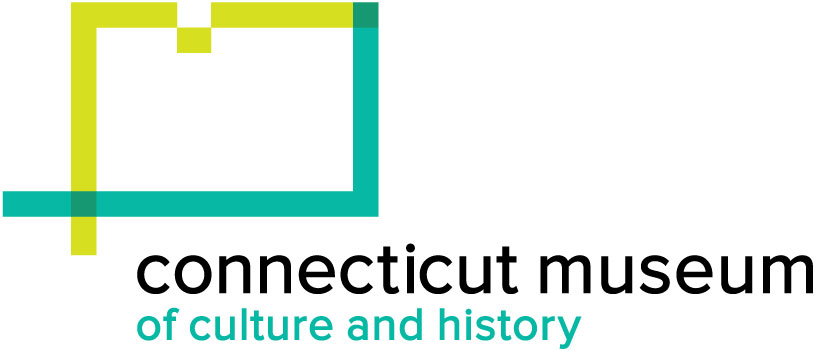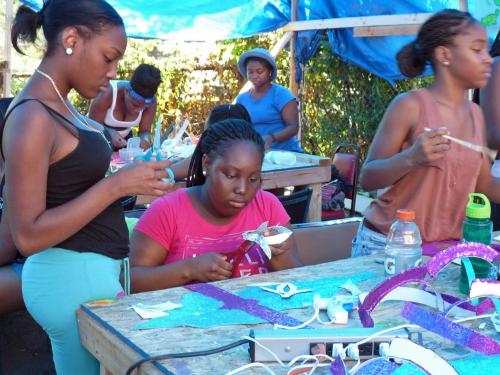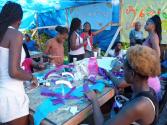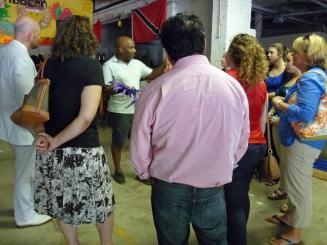Mas Camp Costume Preparation, 2014
SubjectPortrait of
Coryse Villarouel
(Trinidadian)
SubjectPortrait of
Alwin Cooper
(Trinidadian)
SubjectPortrait of
Harold Springer
(Trinidadian)
Date2014 July 23
Mediumborn digital photography
ClassificationsGraphics
Credit LineConnecticut Cultural Heritage Arts Program collections
CopyrightIn Copyright
Object number2015.196.512.1-.14
DescriptionPhotographs of Mas Camp costume preparation on July 23, 2014.
(.1-.6) Images of the Mas Camp students working on costumes at the Camp.
(.7-.8) Images of the Mas Camp students rehearsing their dance routine with dance instructor Coryse Villarouel.
(.9) Image of a Mas Camp student trying on her mas headdress.
(.10) Image of one of the Mas Camp section costumes.
(.11) Image of Mas Camp educator Lerry Cooper assisting students with making their costumes.
(.12) Image of the Mas Camp students working on costumes at the Camp.
(.13) Image of Harold Springer standing in front of the Mas Camp workshop venue with a backpack costume behind him.
(.14) Image of a banner for the Taste of the Caribbean & Jerk Festival.
NotesSubject Note: Hartford’s West Indian Independence Celebration began in 1962 to commemorate Jamaica’s and Trinidad and Tobago’s independence from the United Kingdom. The week-long celebration usually concludes with a parade and festival downtown featuring floats, steel band performances, and groups of local masqueraders displaying brilliant costumes called Mas. Mas represents an important and beloved art form in the West Indian communities that make up a vibrant component of Hartford’s population. The costumes and the traditions behind them serve as central expressions of cultural identity and heritage. The beauty of the costumes displayed by Hartford’s own masqueraders in the parade and festival, along with the excitement of their dance routines, bring a tremendous energy and pride to the city’s West Indian communities.(.1-.6) Images of the Mas Camp students working on costumes at the Camp.
(.7-.8) Images of the Mas Camp students rehearsing their dance routine with dance instructor Coryse Villarouel.
(.9) Image of a Mas Camp student trying on her mas headdress.
(.10) Image of one of the Mas Camp section costumes.
(.11) Image of Mas Camp educator Lerry Cooper assisting students with making their costumes.
(.12) Image of the Mas Camp students working on costumes at the Camp.
(.13) Image of Harold Springer standing in front of the Mas Camp workshop venue with a backpack costume behind him.
(.14) Image of a banner for the Taste of the Caribbean & Jerk Festival.
Subject Note: From 2011-2020, the Connecticut Cultural Heritage Arts Program at the Connecticut Historical Society partnered with the Connecticut Caribbean International Carnival Association to offer an annual summer youth employment program that trains Hartford youth in Carnival traditions central to their ethnic background. At the six-week “Mas Camp,” participants learned about the history and role of Carnival and masquerade. They designed and created their own Carnival costumes under the guidance of experienced Mas artists. The teens along with over two dozen volunteers, formed a Carnival Band that participated in several summer events showcasing Mas costumes totally made in Hartford. Mas Camp has helped to ensure that the Carnival tradition continues by training a new generation in the art of Mas making. In 2017, Mas Camp was selected as one of 50 exemplary youth programs nationwide by the National Arts and Heritage Youth Program.
Mas Camp was both a jobs program and an arts learning experience with social impact. The program mentored students in workplace readiness, social engagement, and cultural knowledge, offering alternative creative activities that fostered community involvement while providing fulfilling employment. Participants learned new skills including Caribbean cultural history, costume design, garment sewing and construction, creative movement, and teamwork. The teens experienced first-hand how to follow an artistic idea from background to completion and presentation, working both individually and collaboratively. Through the program, youth discovered that giving back to their community is an essential part of becoming a productive citizen. They experienced the joy of being part of a larger cultural group, and contributed their new skills to community activities.
During Mas Camp, the teens created their own costumes following themes and color schemes that they chose. The students and staff, along with volunteers from the community, formed a Carnival band they named Exotic One’s. Hartford costume maker Keimani “Q” Delpeche, who grew up in the Mas tradition in Trinidad and Boston, taught design and building of all the types of costumes. Choreographers including Clerona Cain and Coryse Villarouel developed dance routines with the students to train them in “displaying” their costumes in a parade. Some former students became peer educators helping to supervise Mas Camp activities in later years. The mentorship of several committed community educators and cultural leaders supported the teens and provided positive role models. The beauty of the costumes displayed by Hartford’s own masqueraders in the West Indian Parade and other festivals, along with the excitement of their dance routines, bring a tremendous energy and pride to the city’s West Indian communities.
During the summer of 2014, twenty-one young people and over eighty volunteer and returning students participated. Costume maker Keimani “Q” Delpeche created the designs along with experienced assistant Lerry Cooper, and many volunteer parents. Artistic director Harold Springer, dance teacher Coryse Villarouel, and dance assistant Asher-Lee Plummer trained the students in “displaying” their costumes in a parade. They formed a Carnival “Band” called the Exotic One’s, with five sections of masqueraders in different color schemes portraying the theme of “Carnival is Colors – We are Carnival.” The Band performed with their costumes in the Taste of the Caribbean Festival at the Riverfront on August 2, the Wadsworth Atheneum for First Thursday August 7, and the West Indian 52nd Anniversary Independence Parade and Festival on August 9.
Biographical Note: Harold Springer was involved in all aspects of Carnival in his native Trinidad, including calypso and steel pan music as well as masquerade costume-making and display. When he moved to Hartford in the early 1990s, he became Treasurer and then Vice President of the Trinidad and Tobago American Society here. He was a co-Founder of the Hartford Carnival Association in 2000 and has also served as Treasurer and now Director of Operations for CICCA. Among his responsibilities in that position, he organizes sections and bands to perform at West Indian events all over the Northeast. He specializes in the coordination of costume “playing” with music and dance, as the complete Carnival presentation. For many years Harold organized bands that performed at the West Indian Parade and the Taste of the Caribbean. He worked with the Mas Camp project from 2011-2014 as Artistic Director/Performance Consultant.
Biographical Note: Alwin “Lerry” Cooper, a part-time project educator in 2011, took on a wider role in 2012, and has been a key educator in 2013-2015 and 2020, teaching the teens how to work with the fabric, glue, decorative materials, etc. to bring their designs and the master artist’s designs into being. He is a record producer and event promoter, as well as an advisor on the West Indian Celebration Committee and President of The Mad Man Crew Mas Band that performs in the West Indian Parade every year. Mr. Cooper is a founding member of Connecticut International Cultural Carnival Association (CICCA), serving as its Director of Administration and Planning for several years. From Trinidad, he has produced costumes for carnivals in Hartford; Toronto; New York; Jamaica; Boston; Orlando; Washington, DC; Atlanta; and Trinidad.
Biographical Note: Coryse Villarouel is from Trinidad where she grew up playing mas. In Hartford, she learned to dance with the Cultural Dance Troupe of the West Indies, and she still teaches there part-time. Coryse has organized her own dance group for young people in Torrington. She assisted Harold Springer in advising the teens on dance movements when wearing the costumes, so they could learn Carnival performance skills. With her guidance and choreography, the teens were able to perform an extended high-energy routine as the main attraction at the Taste of Hartford event and during the long route of the Parade. She also choreographed dance routines that the teens performed at the Festival held at Bushnell Park after the Parade in 2014.
Additional audio, video, and/or photographic materials exist in the archive relating to this community and these events.
Cataloging Note: This project was made possible in part by the Institute of Museum and Library Services MA-245929-OMS-20.
Status
Not on view


























